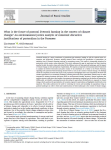Darmet L., Barnaud C. (2025). What is the future of pastoral livestock farming in the context of climate change? An environmental justice analysis of contested discursive justifications of pastoralism in the Pyrenees. Journal of rural studies, 01/07/2025, vol. 117, p. 103654.
https://doi.org/10.1016/j.jrurstud.2025.103654
https://doi.org/10.1016/j.jrurstud.2025.103654
| Titre : | What is the future of pastoral livestock farming in the context of climate change? An environmental justice analysis of contested discursive justifications of pastoralism in the Pyrenees (2025) |
| Auteurs : | L. Darmet ; C. Barnaud |
| Type de document : | Article |
| Dans : | Journal of rural studies (vol. 117, July 2025) |
| Article en page(s) : | p. 103654 |
| Langues : | Anglais |
| Langues du résumé : | Anglais |
| Catégories : |
Catégories principales 06 - AGRICULTURE. FORÊTS. PÊCHES ; 6.4 - Production Agricole. Système de ProductionThésaurus IAMM PASTORALISME ; ELEVAGE EXTENSIF ; CHANGEMENT CLIMATIQUE ; PYRENEES ; EUROPE |
| Résumé : | Livestock farming is a major contributor to greenhouse gas emissions, leading to calls for reduced meat consumption and production. However, existing research often overlooks the specificities of pastoralism, an extensive form of livestock farming practices in mountainous areas. This results in intersecting injustices for pastoralists, which remain under-researched. This article addresses this gap by exploring how these injustices manifest locally, the justice claims articulated by the different actors of these pastoral landscapes, and the impact of climate change on their perceptions of pastoralism. We employ an empirical environmental justice framework to analyze the diverse discourses and justice claims of the inhabitants of a valley in the French Pyrenees, regarding how pastoral livestock farming should evolve (or not) in the context of climate change. Our findings reveal the complexity of issues that impact rural populations and highlight intra-rural inequalities. We show that climate arguments do not necessarily challenge prevailing discourses about pastoralism; instead, they are often integrated in existing dominant discourses about its environmental benefits. However, climate arguments also support minority views about the benefits of spontaneous reforestation resulting from the decline of pastoralism. Additionally, we identify a growing discourse advocating for agricultural diversification in response to climate change, which questions the specialization of mountain regions for pastoralism and highlights related land access injustices. This study underscores the need for centering the voices and knowledge of populations living in pastoral landscapes in order to foster just transformations of these landscapes in the context of climate change. |
| Cote : | Réservé lecteur CIHEAM |
| URL / DOI : | https://doi.org/10.1016/j.jrurstud.2025.103654 |







